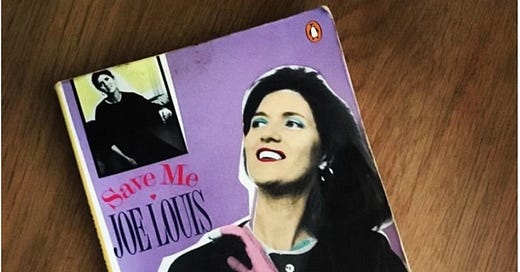Occasionally I’ll reprint something from my archive of speeches and other writing for all subscribers - like this 2017 tribute I wrote to the Australian writer Kate Jennings. It’s about what her book of essays Save Me, Joe Louis taught me as a young woman, about growing up and out of my own sad-girl-novel (and life) impulses.
Save Me Joe Louis, by Australian writer Kate Jennings, was first published in 1988. It’s about living between Australia and the US, and the way both countries shaped the young Jennings through her childhood, the political awakenings of early adulthood, and into the questions and re-evaluations of middle age.
I first read it as a 23-year-old student, a middle class white girl with aspirations to write fiction. I can see now that at that time my writing – much like my life – was infused with … self-pity. And a dreary kind of self-promotion. It wasn’t that I wrote about myself in my work – or, not exactly – but rather that flowing beneath the pallid fictional surface of all my stories was a shameful but urgent desire to be admired.
My characters were invariably Sensitive Young Women. Inexplicably, men treated them callously. My young women observed their worlds closely – they noticed things. Things like dust motes turning in the air, or the dropped flower of a frangipani on the footpath, or the steam rising from a cup of oolong tea. They felt things – lyrical things, political things – very, very intensely. Their houses had a crumbling grandeur, they were poor but they drank from exquisite tea cups found in thrift shops. They were willowy and sad. They arranged themselves in picturesque domestic scenes and, by keeping very still, themselves became decorative. They watched, and felt things, and ‘said nothing and turned away’.
The one thing my characters never, ever did back then was act – because to act would be to show yourself, to take a risk. And I was not ready for that.
I don’t want to be too hard on this 23 year old self. I was just learning to write, after all, as I was just learning to live – but when I reread Save Me Joe Louis now, so tied up with my memory of my young self, I see that maybe the reason for all this careful passivity of mine was that like many young women, I was filled with so much self-doubt that there wasn’t any room for self-questioning. I had to shore up all the doubt – about myself, men, feminism, politics in general – by concealing any trace of confusion.
Like all my friends, I found solace in political beliefs and behaviours so unassailably correct they could never be challenged, so I would never have to defend them – and I would never have to risk finding out what I actually thought.
But when I read this book I began to understand something important: that the disorder caused by tough questions to the self – the energy created by arcing up, opposing your own beliefs for a minute, behaving in a contradictory way, revealing something indecorous about yourself – this was what might give energy and life to my sluggish writing. Now of course, I think it is also what gives life to life.
Kate Jennings made me see all this, in this slender book of essays about going to a school reunion, about 1970s campus feminism, about drinking, about Dusty Springfield, about reuniting with a mother you despised in your youth and finding the surprise of compassion and respect blooming inside you.
These essays showed me that strangely there could also be a tranquillity in self-questioning, and freedom in contradiction. For here was a Riverina farm girl living in Manhattan. Here was a radical feminist who got married. An atheist who prayed, a poet who worked on Wall Street.
Kate Jennings showed me that for young women like myself who had two settings - weepy or outraged - thinking might be a more important skill to develop than feeling. In one essay, about her own literary development, she says this:
‘Rage and a well-developed sense of indignation don’t make a good writer, as I was finding out. Objectivity, compassion, and a sense of proportion do. I began to realise that woman as anguished artist and noble victim was a dead end.’
It took me a long time to enact these changes in myself, but it was this book that first showed me how it might be done. So I would like to thank you, Kate Jennings, for Save Me, Joe Louis. Thank you for your intelligence and honesty, and for showing me at just exactly the right moment that experience is layered and changeable, that there are many paths away from the dead end, and if there’s any truth to be found, it lies not in certainties but the deep and rich spaces between them.
Thanks for helping me grow up.
- 2017





I loved this- so hopeful and charming. How to live, act and think in a world- that is the perennial question!
Oohh, whilst I do not write for a living, this resonated deeply for me… images of my younger, somewhat desperate self… probably reeking of that inner state- yet determined to deny it..